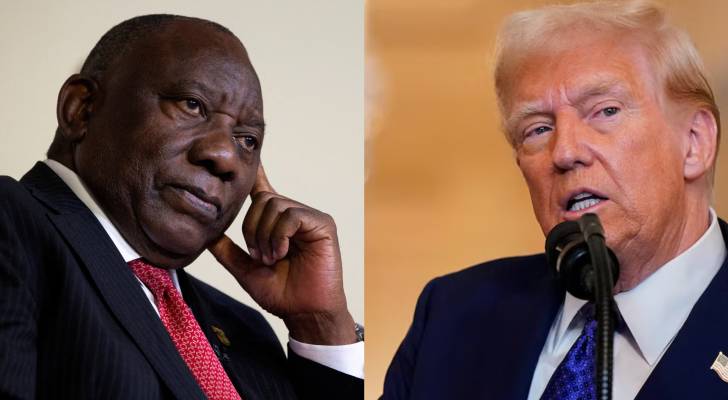South African President Cyril Ramaphosa (left) and US President Donald Trump (right).
Trump cuts US aid to South Africa over land policy, ICJ case against "Israel"
President Donald Trump signed an executive order on Friday freezing US financial assistance to South Africa, citing concerns over its land policy and its genocide case against "Israel" at the International Court of Justice (ICJ).
In 2023, the US allocated nearly USD 440 million in aid to South Africa.
South Africa's government condemned the order as factually inaccurate, arguing it ignored the country’s history of colonialism and apartheid.
The White House also announced plans to resettle white South African farmers as refugees through the US Refugee Admissions Program, prioritizing Afrikaners—descendants of early Dutch and French settlers. South Africa criticized this, pointing out the irony of offering refugee status to one of the country’s most privileged groups while denying asylum to vulnerable people from other parts of the world.
Trump has previously claimed, without evidence, that South Africa is seizing land and mistreating certain groups. President Cyril Ramaphosa defended the land policy, stating that it is not a “confiscation instrument” but part of a “constitutionally mandated legal process” aimed at addressing racial disparities in land ownership.
He emphasized that the policy would ensure public access to land in an “equitable and just manner.”
In a speech to parliament on Thursday, Ramaphosa appeared to respond to Trump’s criticism, asserting that South Africa would remain united amid rising global division. “We will not be deterred. We are a resilient people. We will not be bullied,” he said.
Under the controversial expropriation law, South Africa’s government can seize land without compensation if it is deemed to be in the public interest, particularly when the land is underutilized or when an agreement with the owner fails. While the law has yet to result in land expropriation, it is seen as a critical step to address the historical land disparities stemming from colonialism and apartheid.
However, the law has faced significant opposition. The Democratic Alliance (DA), South Africa’s largest opposition party, has condemned the law, calling it a threat to property rights and foreign investment. Despite these concerns, the government has continued to argue that the law is essential for correcting racial imbalances in land ownership.
In response to the controversy, US Secretary of State Marco Rubio announced on Wednesday that he would skip the upcoming G20 talks in Johannesburg, citing concerns over South Africa’s land policy and other “very bad things” occurring in the country.
The US decision to cut aid to South Africa comes as part of a broader push to limit foreign assistance, including dismantling the US Agency for International Development (USAID).
Land ownership remains a heated issue in South Africa, where over 80 percent of the population is Black, but they own just 4 percent of privately owned farmland. In contrast, white South Africans, who make up about 7 percent of the population, hold approximately three-quarters of the land.




